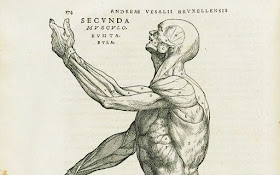Everybody
by Shirley Nelson
I was wearing a blue
coat. It was cabbage and wieners.
They were big cooked wieners,
the smell was cabbage
ah delicious smell
of cabbage out not summer noise was
running water in the kitchen somewhere
Poetry is concentrated language. It compresses a maximum of thought into a minimum of words. William Carlos Williams wrote, "No ideas, but in things." What I like about this poem is that it doesn't play with pretension, writing oh-so-loftily about the Big Things (Love, Truth, Beauty) as concepts from a textbook in a stiff and haughty and unlived way. "Everybody" is terse and hungry. There is no doubt in the universe that Shirley likes cabbage and wieners, big cooked wieners, so much so that she wears them as a blue coat, probably her favorite coat. I am outside the window, leaning on the dusty sill and leaning in. The smell was cabbage (ah delicious smell!), the season was summer, the house is Everybody's, and in the kitchen, somewhere, water was running.
You may not like the poem, you may love it, you may be indifferent, you may not get it. You may be a syntax guy, a sonnet gal. All fine! It's personal for me, for it may not be for you. When I worked as a caseworker with people with Downs syndrome and developmental disabilities, it was a real joy (the people, not the bureaucratic system). They see life through different eyes, unpretentious eyes. They are a true gift to the world, and my four years working with them, being their friend, taking them to Mass with me when I was able, was a privilege.
While cabbage and weiners and coats and sinks may be the stuff of this world that have feet firmly planted in it, there is another kind of poetry that I love that reaches to the heavens while here on earth, and that is the Hebrew poetry of the Psalms.
There is a rhythm to the Psalms that one enters into when they are prayed in plainsong every day; they are meant to be sung. I got to experience this at a Benedictine monastery where I spent the summer chanting and singing the Psalms. Though the translation is different, to this day, I chant my favorite verses from memory because they got in my bones through song:
When I call, answer me O God of justice!
From anguish you release me, have mercy and hear me.
How long, o men will your hearts be closed,
will you love what is futile and seek what is false?
The Lord works wonders for me
the Lord hears me whenever I call him
Fear Him, do not sin. Ponder on your bed and be still.
Make justice your sacrifice and trust in the Lord.
When will we see better days many say?
Lift up the light of your face on us o Lord!
You have put into my heart a greater joy
then they have from abundance of corn and new wine
I will lie down and peace comes at once
for you alone Lord make me dwell in safety.
(Ps 4)
I am not an expert by any means on ancient Hebrew poetry, but the parallelism (both synonymous and antithetical) employed by the Psalmist moves the words down so that they settle into your bones. Even if you don't know the poetic method by name, you know it by sound. The form is important to the message and imagery.
But the Psalms are not stiff and formal dead words on a page, but very much alive, because they cover the range of human emotions and experiences in totality. The poetic form may constrain the words, but there is a limitlessness and timelessness to the experience of the words that is transcendent. It is human, through and through, and stretches to Heaven with urgency with feet firmly planted in the miry pit, the raging battle, the banks of the stream.
Good poetry is human. It doesn't waste words, but concentrates language. It slaps you awake, takes you abroad without having to leave your chair, borrows your nose and steals your eyes. Good poetry makes a nest in your consciousness. It rents out life and takes notes on the back of diner napkins. It will use syntax and form if it serves its purpose, or it will give you a pass for the show anyway if you can't pay the cost of admission.
Poetry of this sort isn't purely etherial and angelic, but has flesh and bones, a heart and blood. It comes into the world but is not of the world. It picks grain and heals on Sundays, eats the showbread when hungry, dances naked before the ark, drinks barrels of wine in good company, eschews lukwarmness, flips over tables in righteous anger, sees to the heart.
For goodness' sake, THIS IS OUR FAITH! This is not stodgy puritanical Christianity or pharisaical legalism, but fully human Catholicism! It lives in poetry, it lives in song, it lives in LIFE itself! And life is meant to be sung, to be celebrated, and like good poetry...it is meant to be fully lived.







